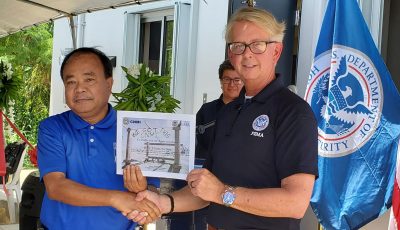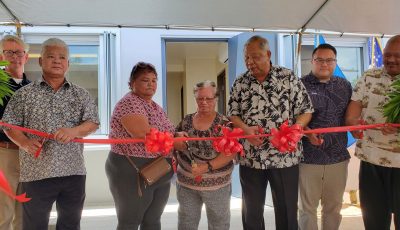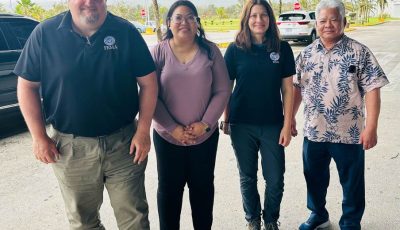CNMI OK’d for $88.73M disaster loan from FEMA
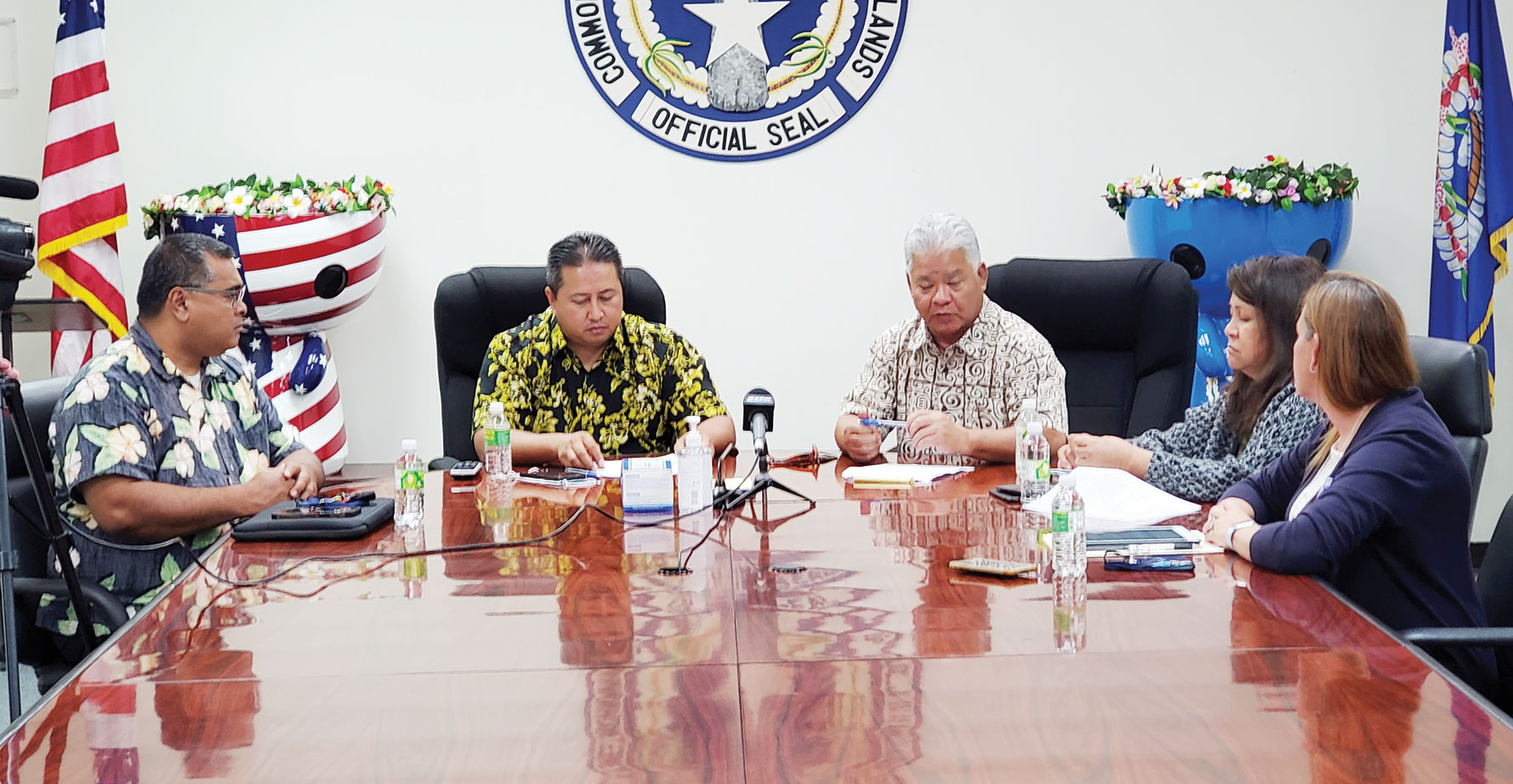
Lt. Gov. Arnold I. Palacios, third from left, explains the importance of the Federal Emergency Management Agency’s approval of the $88.73-million Community Disaster Loan during a news briefing yesterday in the Office of the Governor’s conference room. Also in the photo are, from left, Finance Secretary David DLG Atalig, Gov. Ralph DLG Torres, Governor’s authorized representative to FEMA for Super Typhoon Yutu Virginia Villagomez, and FEMA Region IX Recovery Office director Sheryl Cochran. (FERDIE DE LA TORRE)
The Torres-Palacios administration announced yesterday that the Federal Emergency Management Agency has approved an $88.73- million Community Disaster Loan that will settle the CNMI’s outstanding obligations associated with its response to Super Typhoon Yutu’s devastation in the Commonwealth last October 2018.
Gov. Ralph DLG Torres, who led a press briefing in the Office of the Governor’s conference room on Capital Hill yesterday, said that the total amount—$88,734,930—represents the remainder of the total FEMA loan available and approved at 0.875%.
“We would like to acknowledge and thank our FEMA partners and key staff from the government who diligently followed through to ensure the CNMI accomplishes the necessary steps required to obtain this loan,” Torres said.
The projected revenue loss for the CNMI from Yutu (the year of the disaster plus three years) was $506,837,411. This brings the available CDL loan amount to a maximum of $93,734,930.
FEMA already gave the CNMI $5 million at 0.25% interest last Sept. 30. The $88.73 million yesterday is the remainder of the loan amount.
Lt. Gov. Arnold I. Palacios credited the collaboration and hard work of the Office of the Governor, the Governor’s authorized representative to FEMA for Super Typhoon Yutu, the Legislature, and the Department of Finance in getting the work done. “We’re in a better situation today than we were last week,” Palacios said.
FEMA Region IX Recovery Office director Sheryl Cochran, who attended yesterday’s news briefing, said that acting regional administrator Tammy Littrell thanks the CNMI for its cooperation and teamwork in the last two and a half years following Yutu.
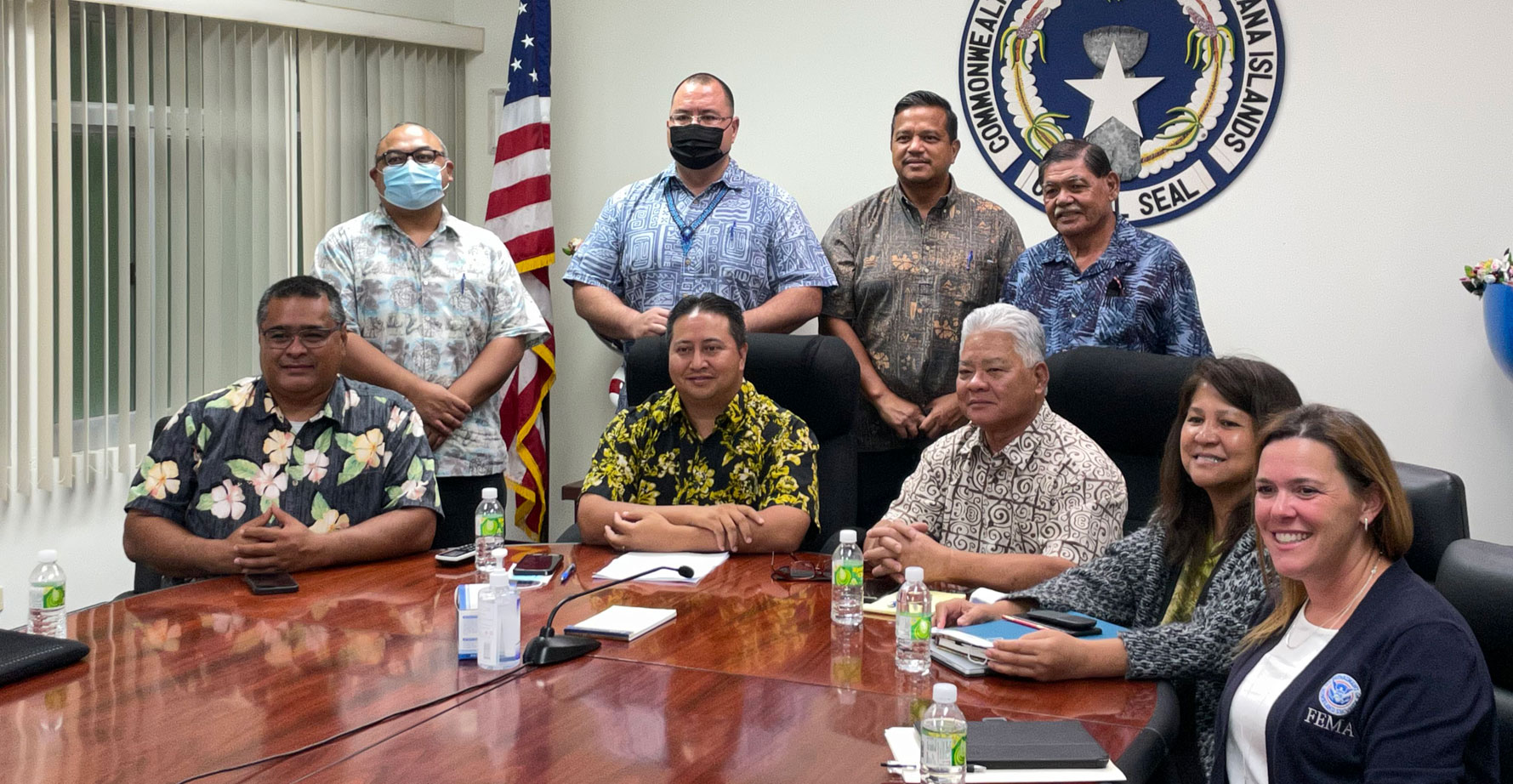
Seated from left, Finance Secretary David DLG Atalig, Gov. Ralph DLG Torres, Lt. Gov. Arnold I. Palacios, Governor’s authorized representative to FEMA for Super Typhoon Yutu Virginia Villagomez, and FEMA Region IX Recovery Office director Sheryl Cochran. Standing, from left, are House vice speaker Rep. Blas Jonathan Attao (R-Saipan), House Speaker Edmund Villagomez (Ind-Saipan), Senate President Jude Hofschneider (R-Tinian), and Senate vice president Sen. Victor Hocog (R-Rota). (OFFICE OF THE GOVERNOR)
“We know that this [loan] is going to help you guys continue with recovery and build the CNMI back stronger. And we’re still going to be here to help you every step of the way,” she said.
Finance Secretary David DLG Atalig said this loan allows the CNMI to rebound as the Commonwealth is still recovering from the effects of Yutu and a lot of vendors still need to be paid and a lot of services and projects still need to continue. “And these funds will be able to help us,” Atalig said.
Virginia Villagomez, who is the Governor’s authorized representative to FEMA for Yutu, said that when a major disaster was declared for the CNMI after Yutu, that automatically triggered the activation of some federal programs. With this loan program, though, Villagomez said they had to wait until the following fiscal year to see the effects of the devastating storm on the islands.
Villagomez said the program can also only be activated at the request of the state.
She cited the many works that have been done, including the help of Delegate Gregorio Kilili Sablan (Ind-MP), that, according to her, were happening during the pandemic and during the time that the administration was preparing the CNMI budget.
Senate President Jude U. Hofschneider, (R-Tinian), who, along with House Speaker Edmund S. Villagomez (Ind-Saipan), attended the news briefing, said the approval of the loan is “a great day for the CNMI.”
“It couldn’t have come at a better time because we’re going to be able to address some of our obligations that have been in the books for a while,” Hofschneider said. “I commend the administration and FEMA and everybody else that’s involved to make this a reality. And of course, the Legislature, we gave our approval based on a joint resolution.”
Villagomez said the CNMI appreciates FEMA’s help and that the loan is an engine that the CNMI needs to keep going to generate revenue and to provide services. He said the loan will help pay off obligations to vendors. “So we are very grateful for any assistance to help us get us back on our feet,” he said in an interview.
In recalling Yutu’s devastation, Torres said the magnitude of the damage sustained from Yutu were significant and stabilizing critical infrastructure services was estimated to be months away. He said the magnitude of the storm’s devastation exceeded the CNMI’s capacity and they acknowledged that their partnership with FEMA and U.S. Department of Defense who were prepositioned to the CNMI pre-landfall tremendously helped the Commonwealth with its response condition.
“The presence of our partners gave us assurance of the unexpected,” he said.
Torres said relief supplies started to arrive as soon as ports became accessible for ships to dock and the runway was clear of debris for humanitarian flights to land.
Torres said all this coordination resulted in 23 sea voyages, 48 intra-island barge shipments, and 152 flights moving humanitarian relief supplies from the continental U.S. to the CNMI—all tied to expenditures the government must provide for its non-federal cost share and much more.
The governor said the government’s revenues was severely affected, prompting the government to drastically reduce its projected revenue by more than 50%, including the reduction in government hours.
Torres said it was in February 2020 when they first inquired with FEMA regional administrator Robert Fenton Jr. to explore the possibility of applying for the CDL Program. Unlike the other FEMA programs, the CDL program requires the State to request that it be activated. He said this loan program is available to local governments adversely affected by a major disaster. He said the program provides operational funding in a form of a loan for local governments to continue to operate after a substantial loss of revenue caused by the disaster.
The CNMI’s request was submitted on Feb. 12, 2020. Three days later, Fenton recommended to the Recovery Directorate to activate the program and designated the appropriate representative from Region IX to work with the CNMI to begin the CDL process.
On May 12, 2020, the CNMI was prequalified and eligible to apply for the CDL loan for up to 25% of the projected loss of government revenues or $93,734,930. However, Torres said, FEMA’s authorization on the loan program was capped at $5 million.
The CNMI was required to complete a 10-part CDL application package and provide a collateral security in a form of a joint resolution by both House and Senate. The 21st Legislature subsequently passed the joint resolution.
Since FEMA’s authorization was limited, Torres said they contacted Sablan to meet and discuss how his office can assist to obtain approval from the U.S. Congress to grant FEMA an authorization to exceed the $5 million cap.
Sablan then met with Fenton to obtain additional information on FEMA’s authorization.
Torres said the meeting with Sablan on May 13, 2020, and with Fenton on May 15, 2020, was favorable to the CNMI as it resulted in the passage of H.R. 133, which included provisions to allow FEMA to exceed the loan disbursement. It was signed by then-president Donald Trump last Dec. 27.




